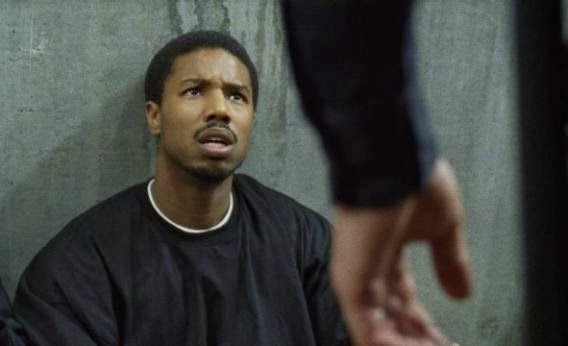Fruitvale Station
Fruitvale Station - Crushing
 |
| CRUSHING |
Adapting a news story into a film is always a tricky proposition. For the most part, there isn't much suspense since the end game for people involved in said story is known. However, when you're able to create suspense and make an audience forget about the ending and concentrate on what is happening in front of them, that's the definition of film-making. "Fruitvale Station" is a crushing cinematic experience that explores race relations, social media, and laws that discriminate against young minorities, even in a state as progressive as California.
"Fruitvale" is based on the shooting of Oscar Grant by BART officers on New Years Day 2009 in Oakland, California. The film begins with cellphone video footage of the arrest and shooting of Grant by the officers. After the first harrowing few minutes the film turns to the last 24 hours in Oscar's life, a 22-year old drug dealer trying to walk the line to provide for his girlfriend and 4-year old daughter.
Ryan Coogler, who directed "Fruitvale", has created an experience where you forget about the inevitable ending for Oscar and concentrate on his life, which makes the ending all the more crushing. Michael B. Jordan, who portrays Grant, shows how far he's come from playing Wallace on "The Wire." Jordan gives a performance that was certainly overlooked for some major awards in 2013. While most people will not know the nuances of Grant outside of his friends and family, Jordan's performance is likeable and heartbreaking and you feel the pain of Grant's mother, played excellently by Octavia Spencer, when her son is ripped away from her come the end of "Fruitvale."
This might be oft-topic, but ironically enough, Jordan has also been named as the next Johnny Storm in the upcoming "Fantastic Four" reboot at Fox. As many may know, typically in comic lore, Storm, aka, The Human Torch, is a white character. With that news, you would have thought that an entire fan-base had been shot in the back. Sure, this comparison might be a bit tacky, but it goes to show the division that we still have as a society. If as many people got upset about the slaying of Grant in Oakland as people did at the fact that a black actor was set the play a traditionally white comic book character we might be on the right track as a people. My two-cents of course would be this; why not make both Johnny and Sue Storm, aka, The Invisible Girl, both black as opposed to explaining away the fact that one of them had to be adopted or something else to that extent. Just had to put that out there.
It's unfortunate that films like "Fruitvale" have to be made. As a society we continue to see tragedies like Grant's death and more recently the shooting of Trayvon Martin in 2012. As long as humans continue to exists there will be shootings and crimes against people that are based on profiling and prejudices. The triumph, if you will, of "Fruitvale" is the hopeful aspect that maybe white people don't need to be scare of black people. The portrayal of Grant isn't glamorous and overblown, it's a portrayal of someone trying to get their act together while also trying to rise above stereotypes. One of the most powerful scenes in the film is Oscar meeting a young white woman (Ahna O'Reilly) in a grocery store. At first you see hesitation on her part, a typical "white" response, when Oscar asks her what she's looking for. After a moment however, and Oscar picking up on her hesitation, there is a very human moment between the two. The time is over to be scared of young black men white people!
Overall, "Fruitvale" showcases not only a rising star in Jordan, but also is a touchstone for race in cinema. If "12 Years A Slave" is the best film of 2013, than "Fruitvale" is its more accessible and relatable younger sibling.
"Fun" Fact: BART stands for Bay Area Rapid Transit and has been in operation since 1972.